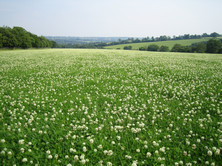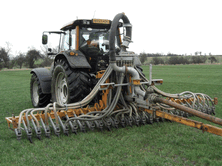Fertiliser - A Sustainable Future
Failing to apply adequate fertiliser at the appropriate time to meet crop requirements can be extremely costly in lost yield of forage dry matter. It is even more expensive to take on more land or to purchase forage than it is to buy fertiliser even when the price is through the roof.
Reduced forage yields resulting from the potential lack of fertiliser in the face of rising feed prices would be a disaster for most farm businesses
Our advice is clear, high fertiliser prices are here to stay. Use fertiliser effectively. Re-seed when appropriate. New leys are far higher yielding and modern grasses have much better feed value than weed grasses. There is no point throwing expensive fertiliser at tired, old un-productive swards.
Make full use of the new Aber White Clovers wherever possible. MDC and IGER trials have clearly demonstrated that there is no yield penalty when grass only sward with 300 kg Nitrogen / ha are replaced with grass / Aber white clover swards with no Nitrogen fertiliser application.
Getting the most out of your soi l
l
Clovers can fix huge amounts of nitrogen when growing conditions are optimum. Ideally aim for 6.5 pH, 2.5 Potassium Index and 2.5 Phosphorous Index. Sulphur levels are now limiting growth on many farms consequently sulphur should be applied regularly as part of the fertiliser programme. Good drainage and soil aeration is extremely beneficial to clover growth as well as increasing grass growth, reducing nutrient loss, increasing organic matter reserves and earth worm numbers.
Maintaining good levels of Phosphorous, Potassium, Sulphur and soil pH are very beneficial to clover again reducing reliance on expensive conventional Nitrogen fertiliser in a sustainable way.
 Biological products to treat slurry such as Slurry-Ultra are rapidly gaining favour
as a means of making better use of nutrients in farm slurry as well as reducing
both labour costs and pollution. These products can dramatically reduce nitrogen losses from slurry
as well as preventing the formation of thick crusts on slurry, greatly reducing or eliminating the costs
involved in stirring. The bacteria in slurry inoculants digest fibre in the slurry and convert nitrogen
from ammonia to microbial protein greatly reducing losses of nitrogen to the air. Also since the slurry
becomes much more liquid, less power is required for stirring and spreading.
Biological products to treat slurry such as Slurry-Ultra are rapidly gaining favour
as a means of making better use of nutrients in farm slurry as well as reducing
both labour costs and pollution. These products can dramatically reduce nitrogen losses from slurry
as well as preventing the formation of thick crusts on slurry, greatly reducing or eliminating the costs
involved in stirring. The bacteria in slurry inoculants digest fibre in the slurry and convert nitrogen
from ammonia to microbial protein greatly reducing losses of nitrogen to the air. Also since the slurry
becomes much more liquid, less power is required for stirring and spreading.
Inoculant treatment of slurry with RWN Slurry-Ultra is an economic, simple efficient means of reducing nutrient loss from stored slurry in order to preserve nutrients for crop growth with a consequent reduction in the purchase of fertiliser.
Slurry treatment greatly reduces ammonia levels in cow housing as well as foul odours during slurry spreading. We also supply liquid fertiliser, contractor applied which offers Nitrogen, Phosphate, Potash and Sulphur for less than the cost of granular fertiliser application. Again liquid fertiliser uses less energy to produce and to apply and is a more sustainable approach.
RWN supplies a wide range of fertilisers, soil conditioners and bio-tech solutions.
For more information contact Richard Webster
